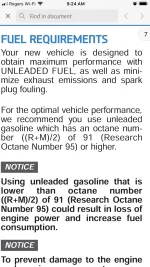TurtleBoy
Registered Member
- Joined
- Aug 30, 2018
- Messages
- 2,765
- Reaction score
- 2,051
- Points
- 113
- Location
- Colorado
- Genesis Model Type
- No Genesis Yet!
Maybe. I would like to read the engineer's test methods to think about how this test was conducted. Their article defines top tier as the brand, not octane, in case there is any confusion going back to the thread topic..
Correct, I was addressing the possible benefits of Top Tier fuel. Those would exist no matter what octane the fuel is.












